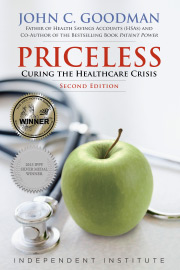Joe Biden has proposed a $4 trillion economic plan. Very little of it pertains to Covid and only a small amount is devoted to roads and bridges. But a lot is devoted to families. That includes $400 billion for in-home care for the elderly and the disabled, $225 billion for family and medical leave, $225 billion for child care, and $200 billion for preschool education.
Is this a good idea?
Let’s start with what’s bad for families. To finance all this largesse, Biden proposes to raise $2.5 trillion in new taxes on business. He also says this burden will only fall on the wealthy. “No one making less than $400,000 will pay any [new] taxes,” he says.
How does that work? The administration economists reason that new corporate taxes will lower profits and therefore lower corporate dividends, interest payments and stock prices. Since wealthy people own a lot of stock, their wealth will go down.
But wait a minute. Doesn’t this same reasoning imply that everyone with an IRA or a 401(k) plan will also be worse off—regardless of their income? And what about teachers, public employees, firefighters and millions of blue-collar workers who are relying on the stock portfolios of their retirement pensions? Schools, hospitals and other charitable institutions also own stock. As a group, the nonprofit sector owns a lot of stock. Then, there are foreign investors, including the retirement funds of workers in other countries.
Finally, there are the people who work for the corporations who are the target of Biden’s new taxes. According to the Joint Committee on Taxation, workers ultimately will bear 25 percent of the burden of corporate taxes. Other economists peg the worker burden at a much higher amount.
So, families have a lot to lose in this plan—in their role as workers, savers, and beneficiaries of schools, hospitals and other charitable institutions.
What do they have to gain?
“The American Jobs Plan and the American Families Plan . . . would give millions of women a real choice between staying at home and holding paying jobs outside the home,” says the New York Times editorial board. Through subsidies for “temporary leave from paid employment to care for a new child or an ailing relative or recover from illness” the Biden plan would “create a new deal for everyone,” the Times argues.
But these problems aren’t new. They have been around for hundreds, even thousands, of years. In all that time, people somehow managed to balance work and family responsibilities without a national family leave law. Why can’t they do the same today? What makes family life today different from conditions, say, 100 years ago?
The answer is that many labor laws restrict the freedom of workers, including the freedom of women who want to balance their lives between family and work.
Uber has shown us what can happen when government mainly isn’t involved. In my informal survey, I find that 90 percent of Uber drivers prefer being independent contractors rather than employees. The most oft cited reason: flexibility. Uber drivers have all the flexibility that the Biden administration and the New York Times want workers to have. When they need to take time off, they take time off. When they are free of family responsibilities, they work and earn money.
Here’s the question: Why can’t all workers do what Uber drivers do? Answer: federal labor law. The labor market may be the most regulated market in our economic system.
Not all jobs are going to lend themselves to the kind of flexibility enjoyed by taxi drivers. But labor law is about as family-unfriendly as you can imagine. Suppose a woman wants to take time off for her son’s soccer game and then make up the time in the next pay period. Federal law doesn’t allow that. Extra hours in the make-up period must earn overtime pay. That means any employer who allows employees to have flexibility gets financially penalized.
Leftwing critics of Uber complain that Uber drivers are denied benefits they would have had if they were employees. But leftwing critics don’t understand the basic principles you can find in almost any introductory economics textbook. Workers tend to get paid the value of their marginal product—what they contribute to their employer’s output. Uber drivers get all their compensation in the form of take-home pay. Most employees take lower pay in return for employee benefits. Absent government interference, these tradeoffs would be made in a free market and they would be tradeoffs that maximize the outcomes for the employees.
The government’s negative impact on families begins with the educational system. Parents aren’t allowed to choose a school for their children the way teenagers choose a college. The only way to avoid a bad school and enroll your child in a better school is to buy a house in a different neighborhood. Typically, that means a more expensive house—one that puts a financial strain on the family. That often means that instead of working in a family-friendly workplace, husbands and wives are pressured to take jobs that earn the most money.
Also, almost one in every three jobs in this country requires a government license and there are myriad restrictions on home-based work in almost every city. These are additional barriers to integrating work and family life.
Employee benefits law adds to the family’s burdens. Suppose a woman doesn’t need health insurance because she is covered under her husband’s plan with a different employer. Federal law makes it illegal for her to forgo an offer of health insurance from her employer and get an increase in pay instead.
So why don’t more people work as independent contractors, like Uber drivers? Federal law discourages them from doing that. They get a smaller tax break for health insurance, retirement savings, and day care expenses, for example. They are forced to buy health insurance in the Obamacare market—with its sky-high deductibles and absurdly narrow provider networks—instead choosing among the much better options available to most employees.
Wall Street Journal columnist Kimberley Strassel and I wrote about these inequities and many more in our book Leaving Women Behind: Modern Families and Outdated Laws.
Before dumping trillions of dollars on an already dysfunctional system, doesn’t it make sense to first see what can be accomplished by liberating families from the oppressive burden federal laws currently impose?
We might find out that Ronald Reagan was right when he said, “Government is not the solution, it’s the problem.”












